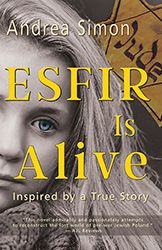Stylistic virtuosity, penetrating emotional power, and a post-apocalyptic vision combine to make this highly individualist effort a brilliant literary achievement. Demanding and rewarding, Ain-Krupa’s book is being marketed as a novel, and it certainly has a strong narrative dimension, though it might be better described as a sequence of prose-poems.
The apocalypse, in this case, is the destruction of European Jewry. What’s left to return to in 1945? Why return? What do survivors do with their survival? What are the sources of identity and relationship in a world of death? These are the questions the author explores, questions more felt than articulated.
A Polish Jew named Wolf returns to a shattered homeland from Brooklyn, where he had managed to live during the Holocaust years. He travels by rail with a young man named Wiktor, who seems a ghostly presence. and with a dog he picks up along the way. Wolf gets to his home town, the neighborhood, the cemetery, but what is left seems unreal. There is nothing to attach himself to. Death is everywhere. He belongs in Brooklyn, where it is easier to live with his memories.
We learn of a school that taught mostly Jewish girls, a school that went up in flames, as did the forty-one girls — all named Sarah. We sense their ghosts, and we imagine the ghosts of the children they did not grow up to birth. We ponder on all of those Sarahs, of all the meanings we can connect to the matriarch’s name.
Ain-Krupa’s book proceeds in larger and smaller vignettes, highly imagistic and suggestive, lush to the ear if sounded. The novel moves in and out of the minds, memories, and aborted hopes of living people who are half-dead and the life-like shadows of the departed, or the almost departed: souls still hovering just above this earth, still clinging to what’s left of Jewish Poland. In limbo. Let them go.
Nameless narrators tell of themselves and of other characters who move through the four sections of the book: Olga, Anna, Maryna, Elżbieta, Niklas, Mateusz. So many of them appear in the promise of youth, a promise that will mostly likely be unfulfilled. Glimpses of Kraków, Łódź, Bialystok, Rybnik, and other places wheel through the pages, along with their ruins. The Upright Heart visits a world that had been caught between the cannibal armies of Germany and Russia, almost literally living off the Jews, eating them either alive or dead.
The story offers instances of care, generosity, and courage. But all we can do in the end is mourn. Imagine all the yahrzeits, all the tears.
For all this, Julia Ain-Krupa gives us something luminous. Something like the memorial candles referenced in her book, something like a memorial prayer, something that could not exist if hope did not exist.
Related Content:
Philip K. Jason is professor emeritus of English at the United States Naval Academy. A former editor of Poet Lore, he is the author or editor of twenty books, including Acts and Shadows: The Vietnam War in American Literary Culture and Don’t Wave Goodbye: The Children’s Flight from Nazi Persecution to American Freedom.





